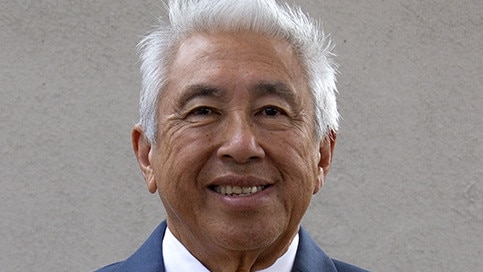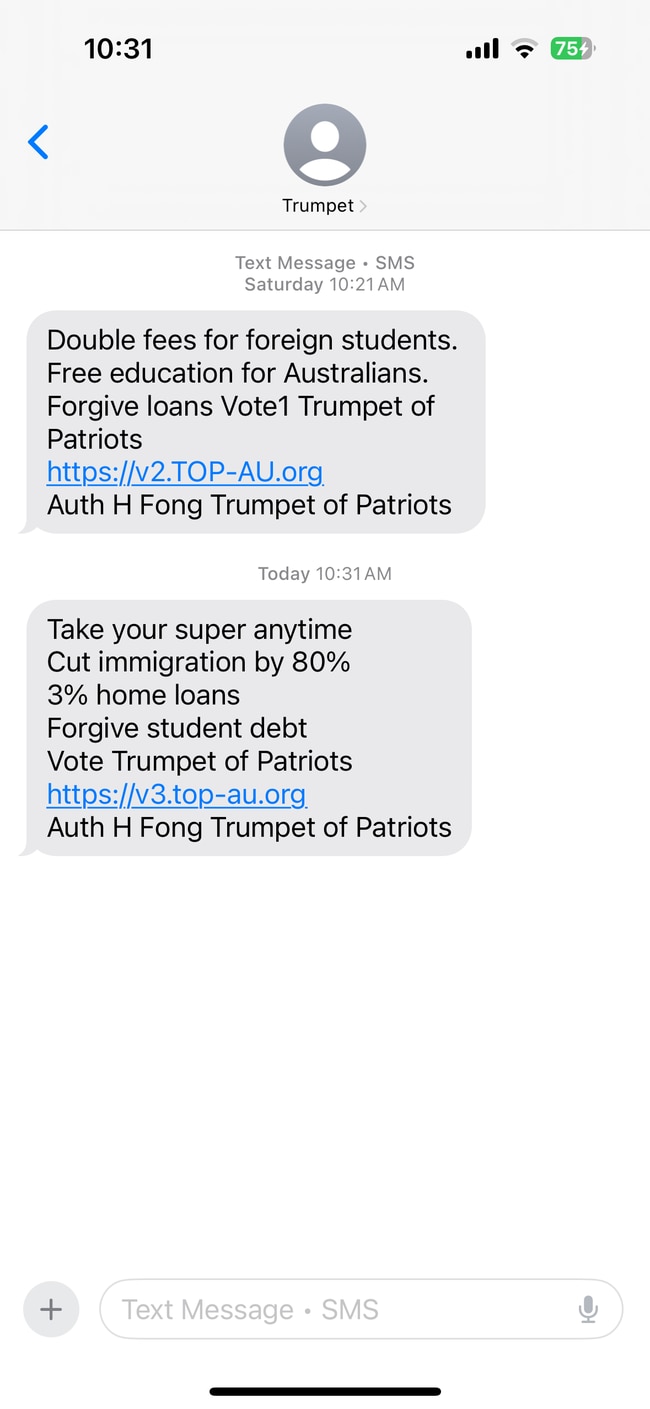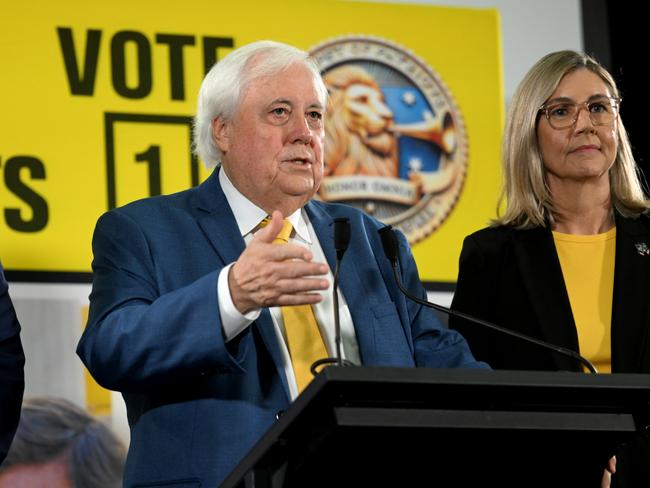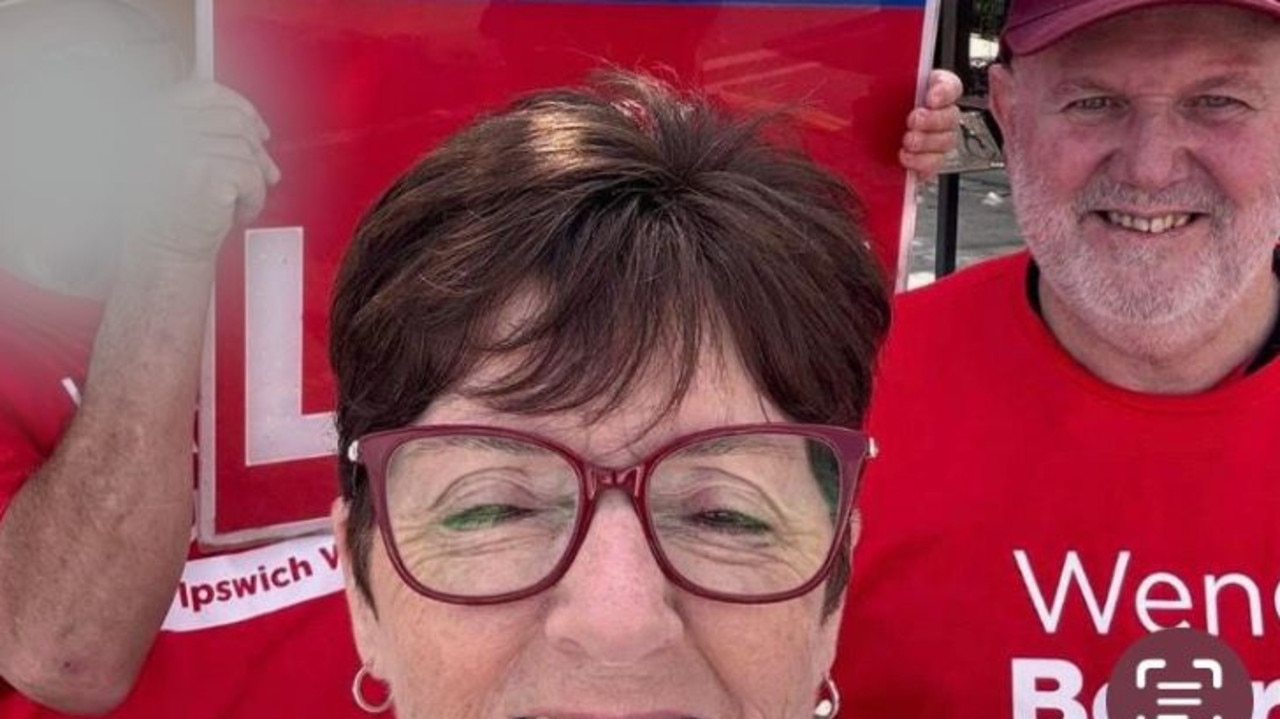Why are so many voters receiving election campaign texts from the Trumpet of Patriots party?
Australians have united to fight back against the Trumpet of Patriots over their influx of unsolicited election texts, targeting the party member authorising the messages.
Aussies fed up with receiving mass texts from Clive Palmer’s Trumpet of Patriots party have fired back, with multiple posts online appearing to show the phone number of the party member authorising the unsolicited messages.
Multiple posts online from frustrated punters share the personal phone number of Harry Fong – the Trumpet of Patriots figure who authorises the blanket texts being sent out by the party – alongside calls to text him back.
“Feel free to treat his inbox the same way he treats yours,” one message online reads.
It comes as a Trumpet of Patriots candidate sensationally quit the party just days out from the federal election.
Mark Aldridge took to social media on Monday night to announce he had resigned from the Clive Palmer-backed party, citing the text message scandal as the reason.
Who are the Trumpet of Patriots?
The Trumpet of Patriots is an Australian political party trying to contest the federal election.
It is funded by Clive Palmer, who took over Trumpet of Patriots after he was unable to re-register his former party, the United Australia Party, for the 2025 election.

Political parties can use mass texting to push their policies and encourage punters to vote for them.
An influx of unsolicited election texts from the Trumpet of Patriots party has left many voters irritated and confused as to how their data has been sourced.
The texts typically include a short policy, a link to the party website – and, notably, no option to opt out of the messages.
Who is Harold ‘Harry’ Fong?
Brisbane barrister Harry Fong is the Trumpet of Patriots’ lead Senate candidate for Queensland.
He is also the one who authorises the mass text messages to be sent.
How is this legal?
A Trumpet of Patriots spokesman said it was acting within the laws that the Liberal and Labor parties legislated.
“The legislation allows political parties to be exempt from the Spam Act and Privacy Act allowing political Parties to SMS,” he said.
Frustrated recipients of the texts have taken their grievances to social media, complaining of the ‘invasive’ and ‘disgusting’ tactics employed by the political party.
Melbourne media personality Jacqui Felgate shared a screenshot to her 414,000 followers on Instagram of the text she had received, prompting more than 700 comments from those who shared her thoughts.

“I do not know why it’s a free for all with private numbers this election,” Ms Felgate captioned the post.
“I work in a non-emergency ambulance and we are getting these texts on the truck phone,” one person commented with an angry emoticon.
Another person complained they “blocked and got another today”.
Senior economist Saul Eslake also took to social media to reveal his annoyance at the party’s texts.
“Why am I getting regular servings of drivel from Harry Fong on behalf of Clive Palmer?” he wrote.
“I haven’t signed up to any mailing list of his (or indeed any other political party).
“How did Harry Fong get my number? And why can’t I block him, or report as spam, as I can do with all other unsolicited and unwanted texts and phone calls I get on an almost daily basis?”

Mr Eslake asked how Mr Fong would feel if his phone was “inundated with unsolicited text messages every day”.
How did they get my number, and why can’t I block them?
Despite the widespread ire, the Australian Electoral Commission said it had “no insight” into how political parties obtained mobile phone numbers, except to confirm that the data “was not provided by the AEC”.
“Political parties are exempt from the Spam Act and the Privacy Act and are able to send unsolicited text messages without an opt out option,” an AEC spokesperson said.
“Any changes to these laws would be a matter for the parliament to consider.”
Therefore, given the text messages are not classified as commercial, they do not require consent nor an unsubscribe link and are under no obligation to disclose how they source people’s phone numbers.
Ultimately, while annoying, the texts are completely legal — and we may never know how our numbers are shared.
Originally published as Why are so many voters receiving election campaign texts from the Trumpet of Patriots party?




